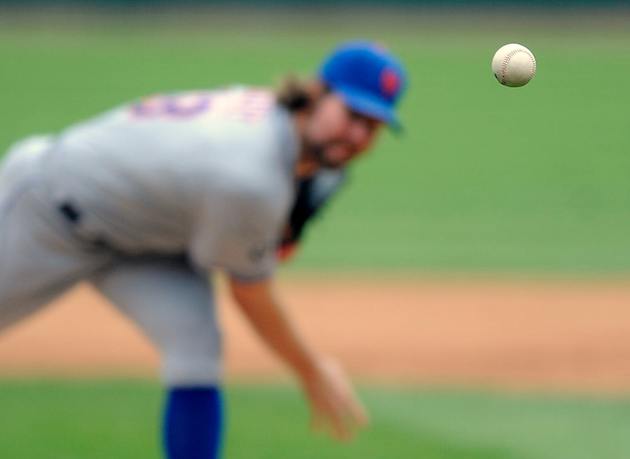 |
| R.A. Dickey and Tim Wakefield are subjects of a new film, Knuckleball! (Getty Images) |
In the end, documentary filmmakers Ricki Stern and Annie Sundberg make films about people, films that tell interesting stories and, yes, even a film about baseball.
Documentary filmmaking is about timing as much as anything -- not only about when you have the cameras rolling, but also when you stop the cameras and show the finished product. In that regard, the duo's latest film, Knuckleball! could hardly come out at a better time. The film is in select theaters and video on demand starting Tuesday, Sept. 18, just as R.A. Dickey wraps up the greatest season ever by a knuckleballer.
In the film, the two follow the changing of the guard of the knuckleballer, as Tim Wakefield records his 200th win and finishes up his career, and as Dickey's ascent continues. We spoke to both recently about the film that features baseball's most baffling pitch.
EOB: What brought you to baseball?
Ricki Stern: To be honest, we're not baseball fans, but our two producers, Dan Cogan and Christine Schomer, are and they brought the treatment to us and it was more about reading the treatment that crystalized the story for us of a handful of guys against all odds, work hard, persevere and stay in the game and do the thing they love. That, I think, struck to the heart of all of our films. They're all very personal stories, even though they're about larger subjects -- criminal justice or genocide -- they are focused on individual stories and their passions to overcome obstacles to better their lives or realize their dreams. That is the story in the knuckleball story and that's what we were drawn to.
EOB: Are you a baseball fan?
RS: Was I a baseball fan? To be honest, I've never been much of a baseball fan and neither is Annie, but I have to say following the season with two baseball players makes you a baseball fan pretty quickly.
EOB: And R.A. has such a great story -- and knuckleballers seem to have great stories.
RS: What's funny about R.A. is, we read the treatment on Monday and on Friday we were on a flight to Florida for spring training. We knew for Tim this was an important year for him because it was potentially his last year. And it was R.A.'s first year with a new contract. We'd only researched R.A. for a couple of days and read about him online and didn't fully understand the story. He was writing his book at the same time. Now there's a lot out there on him, but at the time we didn't fully understand the depth of the story or what kind of person he was until we met him. But I can tell you, within an hour of sitting and talking to him at an Applebee's, I think, you just kind of know this is an amazing story to be told.
EOB: It seems knuckleballers always have a good story.
RS: You're right. I think balancing out what we were going to tell in each of these stories, as well as trying to tell the story of the knuckleball without making it a historical documentary, was a lot of balancing.
EOB: I'm sure watching R.A.'s season has been fun?
RS: It really has been. I truly can't think of a nicer guy for this to happen to. He and his family, they're really just special people. We're thrilled to watch that and also know he's a nice person.
EOB: Before you read this treatment, did you know anything about this pitch?
RS: No. I really didn't. I didn't even know -- I knew Tim Wakefield was a knuckleball pitcher because he was with the Red Sox and my daughter in third grade had to write a "how to" and it was how to throw a knuckleball. She wrote a whole paper about it. And when we told her I'd be doing this film, she went and got an apple and started to show us a knuckleball in the kitchen. But I didn't really understand it until we got into it.
EOB: What I find fascinating about the knuckleball is the reinvention aspect, here are guys who later in their career, for the most part, have to change and do almost the opposite of what they've always done, yet they figure out and can compete at the highest level.
RS: Absolutely, it's a universal message of reinvention and survival. There's also the ability to be able to be successful with craftsmanship and perseverance is something that's unique and can inspire people in their lives.
EOB: What was your relationship with baseball before this film?
Annie Sundberg: I have a long-standing, heartbroken relationship with the Twins. Generally I don't know a lot about baseball and Ricki and I would often talk about that was good for us because we weren't afraid to ask questions that someone with a lot of baseball knowledge would perhaps been hesitant to ask. We would kind of revel in our ignorance, so to speak, and a couple of times R.A. called us out on that. I've always loved the experience of baseball, but I didn't have the sense of the minutiae of the game. (Producer) Christine Schomer presented the project to us, she grew up in a really, really die-hard baseball environment. They regularly went to games and she saw the potential in this story about knuckleball pitchers. Ricki and I started delving into it, and reading Roger Angell, and Major League Baseball helped, a lot of people helped get us up to speed on the baseball side.
EOB: There seems to be a larger theme that comes through with knuckleballers, that it's a reinvention of a pitcher, but it's also an act of desperation …
AS: You hear that a lot, that it's a pitch of desperation. For a lot of people they have to put everything into it in order to keep pitching and to keep playing.
EOB: Like in Ball Four, Jim Bouton has to convince others, and is fighting to go all-in with the knuckleball. Did you go back and read Ball Four?
AS: It was in our material, but it's funny that we had such good timing because Tim Wakefield was just coming out with his own book and we had that and we had that perspective going in. And with R.A. he was writing his book, so he had already gone back and revisited some of the details of his career.
EOB: You've done so many films that seem bigger than this -- you've done films on people unfairly convicted of crimes, genocide -- and this is baseball, it's a smaller thing, it's not life or death, but you can still get wrapped up in it.
AS: I think when Ricki and I think about films, for us it's all about the characters. We have two characters (Wakefield and Dickey) and maybe even a third, the pitch itself may be a character, we aim to tell their story, show what this person is going through. It's not life or death, but for them it is important. For us, we see them reinvent themselves -- it could be a former Marine who becomes, who reinvents himself as a photograper (in The Devil Came on Horseback). And then with Joan [Rivers], it was the story of a performer if not constantly reinventing herself, but really trying to stay vital.
EOB: These guys do it, almost in a similar part of their career, it's almost a last-ditch effort that leads to the knuckleball. And to me, that's fascinating, to find that point in their career.
AS: You have to give up certain dreams. Tim Wakefield always joked that as a knuckler you're more often the anchor and not the ace. Knuckleballers are used and abused. Often they come in when you know the game is decided and you have to finish the game. You're never considered trustworthy.
EOB: It's funny you say that, because you're historically correct, but now you have the great knuckleball ace?
AS: R.A. is a pretty remarkable guy. R.A. was so open with his story, and we were lucky that he may have been thinking about his story, but here he was in his second year of a multi-year contract and doing well.
EOB: What's it been like to watch him this year?
AS: It's been thrilling. I delivered our first child on June 28 and on June 19 we had our entire crew to go see R.A. pitch, it was his second one-hitter that he threw in June. All of Citi Field was alive. It was incredible. To see him on fire like that was so cool. I think people also revel in it because it's R.A. I think part of it is because of the team he plays for. I don't want to say the Mets are the working man's team, but there is something about the Mets. I think they appreciate him and what he's been through. There's something about the link between R.A. and the fans.
EOB: Most importantly, it's great timing for your movie.
AS: It is ironic that the knuckleball is so unpredictable and R.A.'s skyrocketed to the top of the league.
To learn more about the film, you can go to its website, Knuckleballmovie.com or the site for Stern and Sundberg at BreakThruFilms.org.
For more baseball news, rumors and analysis, follow @EyeOnBaseball on Twitter, subscribe to the RSS feed and "like" us on Facebook.




















